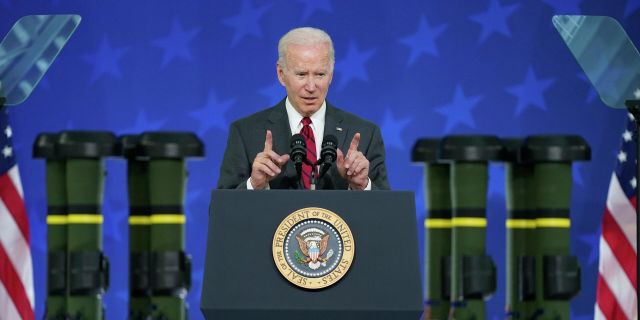We are blindly wandering towards a war on two fronts
The US cannot provide babies with food, inflation is breaking records, but Biden is busy "fighting for democracy", and politicians are satisfied with the prospect of a two-front war with Russia and China. Maybe it's time to stop? – the author of the article wonders.
Biden's apparent rejection of strategic ambiguity was another indication that our establishment is only capable of overestimating its strength.
Goodbye, strategic ambiguity. Speaking at a press conference in Tokyo on Monday, President Joe Biden promised that the United States would use military means to defend Taiwan in the event of a Chinese invasion. One journalist asked Biden: "Are you ready to intervene militarily to protect Taiwan if it comes to that?" The president replied quite definitely: "Yes." The reporter decided to make sure: "Are you ready?" Biden was adamant: "These are our commitments."
I'm sorry if I sound unseemly alarmed, but maybe we shouldn't go this way? For God's sake, can't America avoid a direct confrontation with a nuclear power like the PRC, since we have already engaged in a proxy war with the same nuclear power Russia, and openly admit it?
Biden's statement in Tokyo was so direct and unambiguous that it clearly took the presidential aides who were nearby by surprise, as reported by The New York Times. This is quite understandable. The Supreme Commander-in-chief destroyed the last remnants of a long-standing American policy that gave Beijing the opportunity to think for itself and guess whether Washington would come to Taiwan's aid. The idea of such a policy was that ambiguity and unpredictability serve as a deterrent. If the Chinese know that the American armed forces will repulse them in the event of an attack, they will have to decide one single question: when is the best time to launch this attack, taking into account the political situation and the balance of forces.
Moreover, Biden's "commitment" has fundamentally changed American policy pursued for decades. Taiwan is not an American treaty ally like, say, Japan or Poland, and American administrations have never considered it as such. According to the law "On Relations with Taiwan", which defines its ties with Washington since 1979, the American government is obliged to arm the Taiwanese, but not to protect them directly.
The White House immediately began to repair the damage. His spokeswoman told Fox News in the most improbable way: "Our policy has not changed." The President simply "confirmed our obligations under the law on Relations with Taiwan, which provide for the provision of military means for self-defense to the island."
It is the second time in two years that the Biden administration has had to explain Biden's statements about Taiwan. Last year, CNN's Anderson Cooper asked Biden almost the same question: "Are you saying that the US will defend Taiwan in the event of a Chinese attack?" Biden answered in the affirmative, and then added ominously: the rest of the world knows that America has the most powerful armed forces on the planet. At that time, the administration also had to promptly provide explanations in the sense that Washington in no case departs from the parameters of the one China policy and from the provisions of the law "On Relations with Taiwan".
Most of all, these alarming statements can be explained by the fact that "a poorly thinking old fool makes mistakes." But there is another, more unpleasant and more likely explanation. It consists in the fact that Biden, albeit with excessive enthusiasm, is voicing a new point of view, which is gaining strength in the Washington one-party system. There are other signs. Delegations consisting of former and current officials have visited Taipei frequently. Radical hawk and former Secretary of State Mike Pompeo, as well as South Carolina Senator Lindsey Graham, were seen among their members. In addition, there are rumors about the preparation of the visit of the Speaker of the House of Representatives Nancy Pelosi, and the propaganda of war is growing louder.
Biden's words also coincide with the general mood of the West, which demonstrates its belligerence on both sides of the Atlantic. Read the editorial pages of leading foreign publications, and you will understand that the voices calling for at least minimal restraint and prudent caution constitute a completely insignificant minority, and even this minority is not allowed to speak.
Liberal internationalists once again led the offensive in "defense of democracy." They protect it with bombs and drones, there is no doubt about it. But they are not the only ones acting. I have already noted that, with the exception of Hungary, worthy of respect, the "new nationalists" in the West are increasingly playing second fiddle to liberal hawks and even surpassing them with their pompous rants about the expansion of the very transnational institutions (NATO, the EU) that they promised to limit in their election platforms. Who needs Ann Appelbaum when Polish President Andrzej Duda calls on the EU to accept Ukraine into its ranks without delay? Who needs the Atlantic Council when the leader of the national conservative movement, Chris Demuth, is fiercely demanding war with Russia and China?
This whole picture is kind of surreal. America cannot provide newborns with baby food. Inflation is breaking through the bottom. Gasoline costs seven dollars a gallon. Europe is in the grip of an energy and supply crisis. Nevertheless, the transatlantic political class is quite satisfied with the prospect of a two-front war with Russia and China. The weaker the West becomes in material terms, the more its economy tends to withdraw money and develop useless applications, the more it rots from the inside culturally, and the more aggressive and unbridled it becomes on the world stage.
Get ready, a stormy century awaits us.
Author: Sohrab Ahmari

